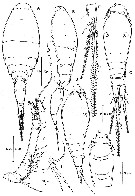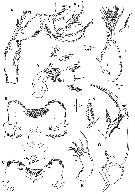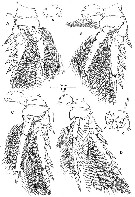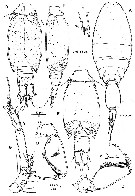|
|
 |
Fiche d'espèce de Copépode |
|
|
Cyclopoida ( Ordre ) |
|
|
|
Oncaeidae ( Famille ) |
|
|
|
Oncaea ( Genre ) |
|
|
| |
Oncaea parabathyalis Böttger-Schnack, 2005 (F,M) | |
| | | | | | | Syn.: | ? Oncaea bathyalis Shmeleva, 1968 (p.1785, figs.M; no F); 1969 (p.16, figs.M; no F); Malt & al., 1989 (p.962, Descr.M, figs.M); Vives & Shmeleva, 2010 (p.276, Rem.) | | | | Ref.: | | | Böttger-Schnack, 2005 (p.194, figs.F,M; Rem.); Vives & Shmeleva, 2010 (p.320, figs.F,M, Rem.); Böttger-Schnack & Machida, 2011 (p.111, Table 1, 2, fig.2, 3, DNA sequences, phylogeny) |  issued from : R. Böttger-Schnack in Cah. Biol. Mar., 2005, 46. [p.196, Fig.16]. Female (from Eastern Mediterranean Sea): A, habitus (dorsal, left caudal seta V missing); B, idem (lateral left side); C, urosome (dorsal, left caudal seta V missing); D, idem (lateral left side, caudal setae IV and V omitted); E, P5-bearing somite and genital double-somite (ventral); F, caudal ramus (dorsal); G, A1 (question mark on segment 4 indicating position of aesthetasc in question, small pit). Nota:
Proportional lengths (%) of urosomites and caudal rami 10.2:50.4:8.4:6.4:11.8:12.8. Relative lengths (%) of segments of A1 measured along posterior non-setigerous margin 8.3:18.9:48.3:11.0:4.5:9.0. Anal somite 1.2 times wider than long, about as long as caudal rami. Caudal ramus 1.9 times longer than wide.
|
 issued from : R. Böttger-Schnack in Cah. Biol. Mar., 2005, 46. [p.197, Fig.17]. Female: A, A2 (lateral elements are numbered using Roman numerals, distal elements are identified by capital letters); B, labrum (anterior, large secretory pore on posterior part of median swelling arrowed); C, idem (posterior); D, Md (showing individual elements, numbered by capital letters); E, Mx1; F, Mx2 (f, seta on outer margin, showing ornamentation details); G, Mxp (anterior) [g, distal element on palmar margin, anterior, showing ornamentation details).
|
 issued from : R. Böttger-Schnack in Cah. Biol. Mar., 2005, 46. [p.198, Fig.18]. Female: A, P1 (posterior); B, P2 (anterior); C, P3 (anterior); D, P4 (anterior (basal seta missing) [d, basis of another specimen, posterior, showing basal seta, arrow indicating aberrant rounded process on outer proximal corner]
|
 issued from : R. Böttger-Schnack in Cah. Biol. Mar., 2005, 46. [p.202, Fig.16]. Male (from Adriatic Sea): A, habitus (dorsal, left caudal seta V missing). Male (from Eastern mediterranean Sea): B, Mxp (anterior); C, idem (posterior) [c, elements within longitudinal cleft of basis]; D, urosome (dorsal, spermatophores almost fully developed); E, idem (ventral); F, idem (lateral right side); G, A1 (proximal aesthetasc on fused segments 4-6 shown separately, length of distal aesthetasc not fully discerned); H, P2 (tip of endopod, arrow indicating sexually dimorphic spine). Nota: Proportional lengths (%) of urosomites and caudal rami 10.7:51.8:4.4:3.9:3.6:12.5:13.7. Relative lengths (%) of segments of A1 measured along posterior non-setigerous margin 8.0.19.6:48.4:24.0.
|
 issued from : A.A. Shmeleva in Bull. Inst. océanogr. Monaco, 1969, 68, n° 1393. [p.17, Fig.13]. As Oncaea bathyalis. Male from S Adriatic Sea).: a, habitus (dorsal); b, urosome (dorsal); c, A1; d, A2; e, Mxp; f-i, P1 to P4.
| | | | | Ref. compl.: | | | Nishibe & al., 2009 (p.491, Table 1: seasonal abundance); Böttger-Schnack & Schnack, 2009 (p.131, Table 3, 4) | | | | NZ: | 2 | | |
|
Carte de distribution de Oncaea parabathyalis par zones géographiques
|
| | | | | | | | | | Loc: | | | Medit. (Alboran Sea, S Balearic Basin, S Adriatic Sea, Ionian Sea, Lebanon Basin), Indian (N Arabian Sea, East equatorial), Japan (Tosa Bay) | | | | N: | 6 | | | | Lg.: | | | (933) F: 0,46-0,635; ? M: 0,40-0,54; {F: 0,46-0,64; ? M: 0,40-0,54} | | | | Rem.: | Mesopelagic.
For Böttger-Schnack (2005, p.201) this species is closely related to O. bathyalis , but differs in the proportional spine length on the endopod of P2, with the outer distal spine being longer than the conical projection, while this spine is only about as long as the projection in O. bathyalis.
O. parabathyalis is a sister species of O. ovalis; they can be separated by the proportional lengths of urosomites, with the 2 postgenital somites being relatively shorter in O. parabathyalis than in O. ovalis; the proportional length of outer subdistal endopod spine on P2, being about 2/3 the length of the distal spine in O. parabathyalis, while the two spines are equal in length in O. ovalis; the proportional lengths of exopodal setae on P5, with the inner element being almost as long as the outer element in O. parabathyalis, while this element is much shorter and spiniform in O. ovalis; proportional lengths of caudal rami, with seta III being longer than seta IV in O. parabathyalis, whereas the two setae are equal in length in O. ovalis, and seta VII, which is shorter in O. parabathyalis than in O. ovalis. These characters allow for a separation of the two species without dissection.
According to Vives & Shmeleva (2010, p.276) the male of O. bathyalis belongs to this latter spesies and not O. parabathyalis. | | | Dernière mise à jour : 26/01/2015 | |
|
|
 Toute utilisation de ce site pour une publication sera mentionnée avec la référence suivante : Toute utilisation de ce site pour une publication sera mentionnée avec la référence suivante :
Razouls C., Desreumaux N., Kouwenberg J. et de Bovée F., 2005-2025. - Biodiversité des Copépodes planctoniques marins (morphologie, répartition géographique et données biologiques). Sorbonne Université, CNRS. Disponible sur http://copepodes.obs-banyuls.fr [Accédé le 31 décembre 2025] © copyright 2005-2025 Sorbonne Université, CNRS
|
|
 |
 |








